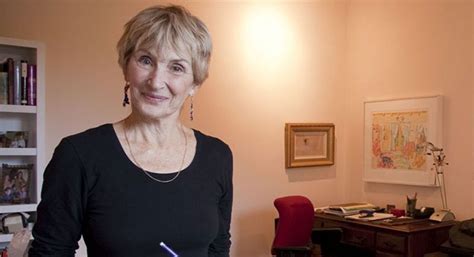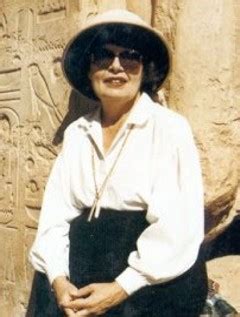A Quote by Ursula K. Le Guin
No matter how successful, beloved, influential her work was, when a woman author dies, nine times out of ten, she gets dropped from the lists, the courses, the anthologies, while the men get kept. ... If she had the nerve to have children, her chances of getting dropped are higher still. ... So if you want your writing to be taken seriously, don't marry and have kids, and above all, don't die. But if you have to die, commit suicide. They approve of that.
Related Quotes
One of my aunties inspires me beause of how easily she shows her emotions, and she isn't ever afraid to cry. My mum, for her work ethic - she might not show her emotions in public very much, but she's a total power woman. My grandma, who watched four of her children die before her, she's a powerhouse.
From the first time he'd met her, he'd sensed an air of contradiction about her. She was very much a woman, but still retained a waiflike quality. She could be brash, and at times deliberately suggestive, yet she was painfully shy. She was incredibly easy to get along with, yet she had few friends. She was a talented artist in her own right, but so self-conscious about her work that she rarely completed a piece and preferred to work with other people's art and ideas.
The first building she reached appeared to be an old barn. Only one young guard stood before its bolted door, staring at her with wide eyes, holding up his sword in defense, She heated his sword and he dropped it, his expression barely changing, as if he had been expecting that. She held up her two swords to his throat, but they were two heavy, so she dropped one and held the other with both hands. "Where are the two Bayern boys kept?" The soldier shook his head. BURN HIM, prompted the fire. The excitement of burning was simmering in her, heating her up for more action.
She'd assumed she'd be married and have kids by this age, that she would be grooming her own daughter for this, as her friends were doing. She wanted it so much she would dream about it sometimes, and then she would wake up with the skin at her wrists and neck red from the scratchy lace of the wedding gown she'd dreamed of wearing. But she'd never felt anything for the men she'd dated, nothing beyond her own desperation. And her desire to marry wasn't strong enough, would never be strong enough, to allow her to marry a man she didn't love.
Where woman has taken her place in business she has found her method ready-shaped for her, and following that, she does her work,if with a certain amount of monotony, yet without undue fatigue. Her hours are fixed, and as a rule she gets needful change of scene as she goes to her business and returns to her home or the place where she lives. But the "home- maker" has not, nor can she have, any such change, and her hours are always from the rising of the sun beyond the going down of the same.
She didn’t understand why it was happening,” he said. “I had to tell her she would die. Her social worker said I had to tell her. I had to tell her she would die, so I told her she was going to heaven. She asked if I would be there, and I said that I would not, not yet. But eventually, she said, and I promised that yes, of course, very soon. And I told her that in the meantime we had great family up there that would take care of her. And she asked me when I would be there, and I told her soon. Twenty-two years ago.
The Winter Woman is as wild as a blizzard, as fresh as new snow. While some see her as cold, she has a fiery heart under that ice-queen exterior. She likes the stark simplicity of Japanese art and the daring complexity of Russian literature. She prefers sharp to flowing lines, brooding to pouting, and rock and roll to country and western. Her drink is vodka, her car is German, her analgesic is Advil. The Winter Woman likes her men weak and her coffee strong. She is prone to anemia, hysteria, and suicide.
She is nine, beloved, as open-faced as the sky and as self-contained. I have watched her grow. As recently as three or four years ago, she had a young child's perfectly shallow receptiveness; she fitted into the world of time, it fitted into her, as thoughtlessly as sky fits its edges, or a river its banks. But as she has grown, her smile has widened with a touch of fear and her glance has taken on depth. Now she is aware of some of the losses you incur by being here--the extortionary rent you have to pay as long as you stay.
Some attribute had departed from her, the permanence of which had been essential to keep her a woman. Such is frequently the fate, and such the stern development, of the feminine character and person, when the woman has encountered, and lived through, an experience of peculiar severity. If she be all tenderness, she will die. If she survive, the tenderness will either be crushed out of her, or—and the outward semblance is the same—crushed so deeply into her heart that it can never show itself more.






































